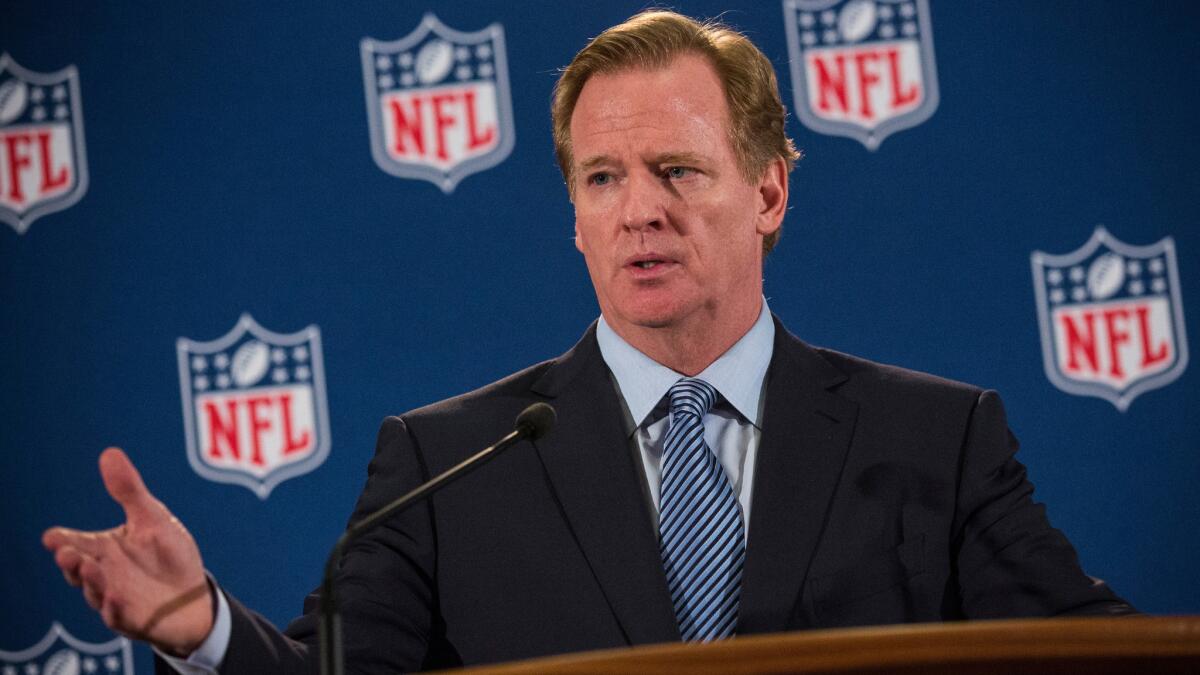NFL owners at the listening stage about personal conduct at meetings

- Share via
Reporting from New York — In the wake of the most turbulent month in NFL history, team owners and executives gathered Wednesday at the annual fall meetings to discuss “social responsibility” and the league’s personal conduct policy.
There were no major decisions made — aside from the unanimous approval of the new Buffalo Bills owners — and the league’s handling of future transgressions is a work in progress while the conduct policy is being revamped.
Even though the season is in full swing, football wasn’t the focus of the daylong talks. Owners spent more than five hours hearing from experts on domestic violence, sexual assault and similar transgressions, and how the league should handle them in the future.
In the end, there were no concrete decisions or changes to the way the NFL conducts its business, only a commitment to keep working on modifications to improve the consistency and efficiency of how players involved in such incidents are punished.
Commissioner Roger Goodell said the league has to strike a balance between allowing accused players their due process while protecting the integrity of the game.
“Sometimes that puts you in a difficult position,” said Goodell, making his first public comments since his widely criticized news conference almost three weeks ago. “When there is strong evidence to the fact that a violation occurred, the question is whether there should be some type of interim step, like a paid leave.”
Several troubling incidents and arrests have dominated NFL headlines in the last month, among them the domestic violence cases of former Baltimore Ravens running back Ray Rice and Carolina Panthers defensive end Greg Hardy, and the indictment on child-abuse charges against star Minnesota Vikings running back Adrian Peterson. Rice is suspended indefinitely, and the other two are on paid leave.
“People want simple solutions to complex problems,” Goodell said at the conclusion of the meetings, held at the upscale Conrad hotel in Lower Manhattan. “But you’re trying to balance the due process with making sure you’re protecting the integrity of the game. My No. 1 job is protecting the integrity of the game, and I will not relent from that.”
One of the major questions the league is grappling with is when to sideline players who have been accused of domestic violence or the like. Should teams make that move after a player is arrested? Charged? Indicted?
“The difficulty there is in different states, they have different requirements,” Texans owner Bob McNair said. “And so what is an arrest in one state is not the equivalent of an arrest in another state, and some states if someone dials 911, police officers come out, they have to arrest someone. Other states, they come out and will investigate and then decide if it warrants an arrest, and in other cases they investigate and turn the information over to the [district attorney] and he’ll determine.
“So you can’t just have one rule.”
Goodell left open the possibility he could have a diminished role in handing out future penalties.
“As I have said, everything is on the table,” he said. “We’ve been debating internally for well over a year whether there’s a better process. At the same time, when something affects the integrity of the game, I think it’s important for the commissioner to retain that authority.”
Lisa Friel, recently hired by Goodell as a special adviser on the issues of sexual assault and domestic abuse, said the expectation is the league will have a consistent policy in place by the Super Bowl at latest, and probably earlier. She said the NFL will continue to gather information and input from advocacy groups and others for a month or so, then begin hammering out a policy.
“The league has to get its own house in order first,” said Friel, a former federal prosecutor who was in charge of sex-crime prosecutions in the New York City district attorney’s office. “Can the league stand as a backbone for society? I think we hope so, now that we’ve drawn so much attention to this issue that we can do some good outside in society.”
Several team owners who are typically more talkative at these meetings were more camera shy, walking briskly with heads down to get to their waiting limousines and avoid the media.
Dallas’ Jerry Jones and son, Stephen, made an early exit for a business meeting nearby. New England’s Robert Kraft waved off questions. Woody Johnson of the New York Jets powered through the hotel’s swanky lobby, shaking off an entreaty by reporters with a raised hand and, “Nah, I’m good.”
Other team owners acknowledged there are more questions than answers at this point.
“I know everybody wants specific answers right away, but that’s just not the right way to do things,” said John Mara, co-owner of the New York Giants. “I was encouraged listening to the presentations today. I think we’re moving in the right direction.”
Bills sale approved
The day began with owners unanimously approving the sale of the Buffalo Bills to Kim and Terry Pegula, who have agreed to purchase the franchise for a record $1.4 billion.
The Pegulas already own the NHL’s Buffalo Sabres and are set to become the second owners in Bills history, following the death of team founder and owner Ralph Wilson Jr. in March.
“If you asked me 10 years ago if I was going to own the Sabres and the Bills, I would’ve called you a liar,” said billionaire Terry Pegula, who made his fortune in oil and gas. He and his wife plan to keep the Bills in western New York, ending years of speculation the team might relocate to a bigger market in the U.S. or Canada.
More to Read
Go beyond the scoreboard
Get the latest on L.A.'s teams in the daily Sports Report newsletter.
You may occasionally receive promotional content from the Los Angeles Times.











